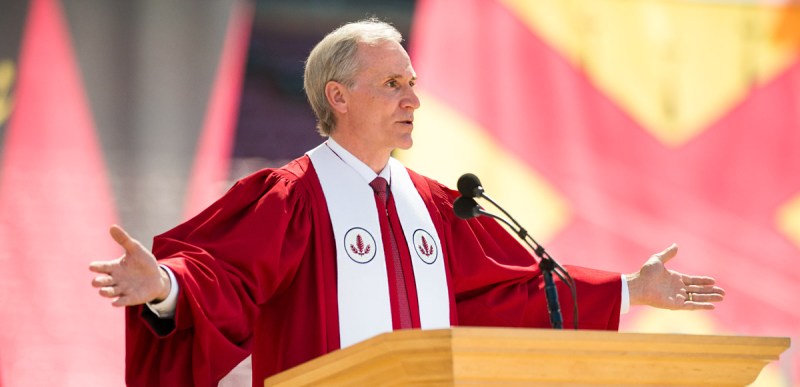Stanford has retained Mark Filip, a former Deputy Attorney General, to lead its investigation of the University president’s research. Some Stanford scientists criticized actions taken by the Board of Trustees, which will direct the review, and said that President Marc Tessier-Lavigne should step down for the duration of the investigation.
The statement, attributed to Carol Lam — head of the special committee appointed to investigate Tessier-Lavigne last week — and Jerry Yang — chairman of the Board of Trustees — made no mention of Felix Baker, the trustee who stepped down from the committee after The Daily raised questions of conflict of interest to the board.
Baker’s hedge fund, which he co-founded with his brother, has $18m of stock in Tessier-Lavigne’s biotech company. Aidan Ryan, senior vice president of public relations firm Edelman which was contracted by the special committee to handle communications, said in an interview that he would “track down an answer” on whether Baker disclosed his financial interests before being appointed to the committee. He later emailed that he did “not have information regarding Dr. Baker.”
Lam and Yang wrote that “Filip — in consultation with the Committee, as well as Stanford University faculty — will engage a panel of leading scientific experts who are highly regarded in the appropriate fields and independent from Stanford University. ” Some experts found this insufficient.
“One would hope that concerns in these scientific papers would be investigated by a team of people with expert knowledge in image forensics and molecular biology, not by lawyers,” wrote Elisabeth Bik, the prominent scientific misconduct investigator who has reviewed a number of Tessier-Lavigne’s papers. Contracting Filip “seems more like an act to make sure the reputation of the university is protected than a step forward to enhance the credibility of the Board investigating these allegations.”
Bik hoped that biomedical image forensics experts would be included on the panel and expressed concerns about the selection process. “It is wonderful that scientific experts will be involved as well, but the fact that a law firm will assign the experts does not institute a lot of trust in how these experts will be selected,” Bik wrote.
According to the special committee’s statement, “This process — and in particular the review by a panel of scientists — will be informed by established processes for such research-related evaluations.”
The board did not explicitly outline what policies would inform the review. The University has a Research Policy Handbook that has been in effect for decades, but Ryan would not confirm whether the president would be held to these policies and guidelines, which govern other research at Stanford.
According to Section 1.5 on Academic Authorship, “There is a tight coupling between authorship and responsibility.”
The handbook states that if “the name of a faculty member has been included on a paper resulting from the relatively independent experiments done by a student or fellow” and “the data are then shown to be faulty, or worse, invented, it seems clear … that the faculty member is responsible.”
According to the handbook, “When one assumes coauthorship, a still higher duty of certainty prevails. The defense of minimal participation in work done in one’s laboratory is generally questionable; surely it is entirely inapplicable when one is coauthor of the disputed work.”
The initial statement provided by the University last Monday said Tessier-Lavigne was “not involved in any way” with the alleged alteration in papers on which he was listed as a co-author and Tessier-Lavigne’s letter to the faculty also said images which had raised scrutiny “are from collaborators’ laboratories.”
Section 1.6 of the handbook states that “All authors in a group effort have a shared responsibility for the published result and should have the opportunity to review all sample preparation procedures and data, as well as all data acquisition and analysis procedures.”
David Chassin, a senior scientist who manages a group of researchers at the SLAC National Accelerator Laboratory, wrote that “This story is evolving in ways that make me question my decision to come to Stanford and SLAC to conduct my research in the first place.”
“Based on the guide, had the research been conducted at SLAC I imagine we would already be processing MTL’s paperwork for dismissal for cause,” Chassin wrote. “The fact that his past research activities did not conform with Stanford’s standards at that time is the most relevant question in my mind, and these revelations should disqualify him from holding any current position at Stanford or SLAC. The credibility of the entire organization is at stake and it should be painfully obvious to all that his personal privilege is subordinated to that of the organization he leads.”
Other researchers agreed with Chassin. “There’s too much at stake,” wrote a Stanford faculty member who has served in several senior administrative positions and requested anonymity due to fear of professional repercussions. “If I were him, I would step aside, certainly while the investigation is [ongoing].”
John Ioannidis, a prominent professor at the Stanford School of Medicine, wrote that, while it was not required, “if [Tessier-Lavigne] did step down, I would see it as a brave and responsible act, fit for someone who has been widely known as a giant in science.” He added that publicly sharing the conclusions of the independent assessment process “would strengthen the perceived credibility of the investigation.”
Ryan did not answer questions about what information would be released from the investigation or whether the panel of scientists would be publicly announced.
“One boggles at the idea that the board doesn’t already see what they must do,” Chassin wrote. The board “seems to be still hoping this will blow over when it’s becoming clear that the faculty is not going to stand for this.”
Ryan did not answer questions about whether the committee planned to ask Tessier-Lavigne to step aside. Tessier-Lavigne, through a University spokesperson, declined The Daily’s request for an interview.
